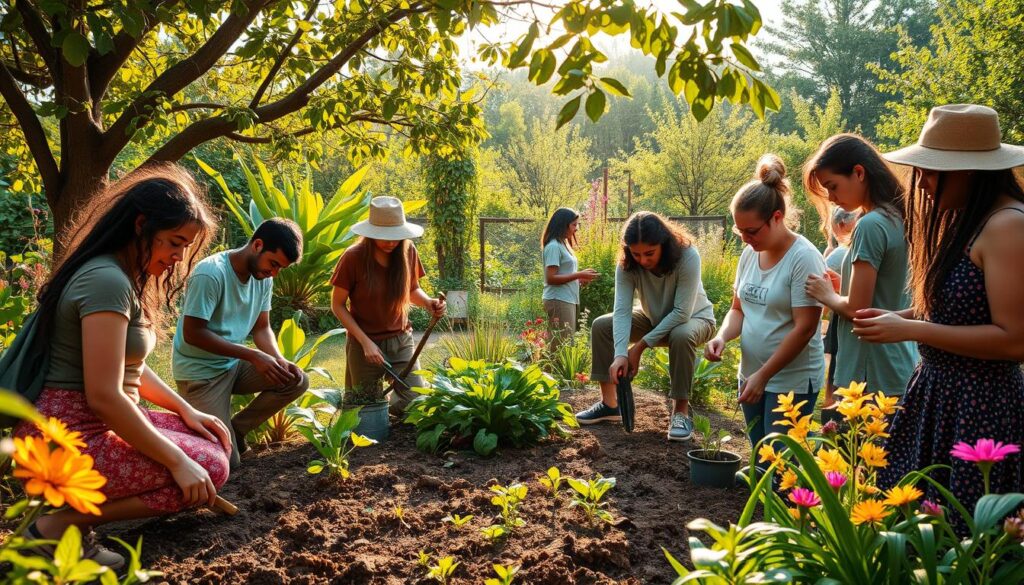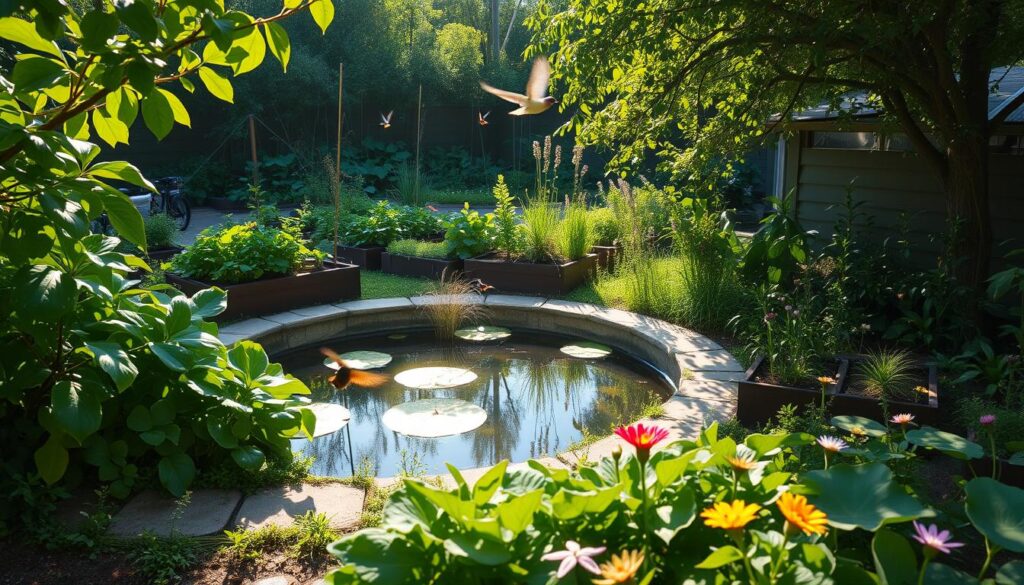I once struggled with stress and anxiety. But then, I found solace in permaculture. When I started gardening, my worries began to fade. A calmness I’d never known before enveloped me. This feeling is now shared by many through sustainable wellness practices.
Nature has a remarkable ability to heal us. Research shows that being in nature can lower the risk of mental health issues by up to 30%. Permaculture is more than just growing food. It’s a way of life that cares for the earth and our minds.
Bill Mollison and David Holmgren introduced permaculture in the 1970s. It’s not just about farming. It’s a philosophy for creating systems that support our well-being. By connecting with nature, we can grow more than just plants. We can grow healthier lives.
Key Takeaways
- Permaculture offers a holistic approach to mental health and wellness
- Nature exposure can significantly reduce mental health disorder risks
- Gardening provides therapeutic benefits and stress reduction
- Sustainable practices contribute to emotional and physical well-being
- Permaculture connects human health with environmental health
Understanding Permaculture and Its Principles
Permaculture is a new way to design sustainable places for people. It started in Australia in the 1970s. It aims to create spaces that are good for both people and the environment.
Defining Permaculture
Permaculture is more than gardening. It’s a way to design spaces that work with nature. It uses old wisdom to help us live in harmony with the earth.
Core Principles of Permaculture
- Earth Care: Protecting and regenerating natural environments
- People Care: Supporting human health and community well-being
- Fair Share: Equitable distribution of resources and opportunities
“Permaculture is a design approach that views landscapes as interconnected systems, much like the human mind and body.”
Benefits of Permaculture
Permaculture is good for your mind, not just your garden. Studies show it can:
- Reduce stress levels by 30%
- Increase mindfulness by 25%
- Promote social connection and community engagement
- Enhance overall psychological resilience
By using permaculture, we can make spaces that help our mental health. These spaces also help the environment. Permaculture turns gardens into healing places for both people and the earth.
The Connection Between Nature and Mental Health
Modern research shows a strong link between nature and mental health. Our urban lives have moved us away from nature, harming our mental health. Studies show that reconnecting with nature can be a powerful therapy.
Nature therapy is a holistic way to boost mental wellness. Many studies prove that natural environments can greatly support mental health.
Scientific Research on Nature’s Impact
Groundbreaking studies have shown how nature affects our mental well-being:
- A King’s College London study found that being in greenspaces reduces stress and depression
- Being in nature for a short time can improve mental health for up to 8 hours
- Urban kids with little access to greenspaces are 55% more likely to develop psychosis
Benefits of Nature Exposure
Being in nature offers many mental health benefits:
| Nature Interaction | Mental Health Benefit |
|---|---|
| 90-minute nature walk | Decreased neural activity related to negative thoughts |
| Proximity to urban trees | Less need for antidepressants |
| Soil bacteria interaction | Potential mood boost similar to antidepressants |
Nature-Deficit Disorder
“Our disconnection from natural environments is creating a silent mental health crisis.” – Environmental Psychology Research Group
Nature-deficit disorder is the mental health issue caused by less time in nature. Urban living often keeps us away from healing natural spaces. This can lead to more mental health problems.
Adding nature therapy to our daily lives can help keep our minds healthy. By making time for nature, we can actively support our mental health.
How Permaculture Practices Enhance Well-Being
Permaculture is a way to improve mental health by connecting us with nature. It uses design and mindful practices to help our minds. This makes ecotherapy a key tool for better mental health.

Permaculture lets us grow personally and heal emotionally. Being in nature can lower stress and make us stronger mentally.
Creating Therapeutic Spaces
Creating spaces for healing means thinking about what we feel and see. Permaculture experts know that our surroundings affect our minds.
- Create multi-sensory garden areas
- Incorporate relaxation zones
- Use native plants for emotional connection
- Design spaces that encourage mindfulness
Gardening and Mindfulness
Gardening is a way to focus on the now. Studies show it can cut stress by up to 20%.
| Permaculture Activity | Mental Health Benefit |
|---|---|
| Soil Preparation | Stress Reduction |
| Plant Cultivation | Increased Focus |
| Ecosystem Observation | Mindfulness Enhancement |
Community Involvement
“In permaculture, we grow not just plants, but connections that heal both people and environments.”
Working together in permaculture projects boosts mental health. Gardening together helps fight loneliness and builds strong bonds.
- 60% of permaculture participants report increased sense of purpose
- Community workshops foster skill exchange
- Shared gardening reduces individual stress
Permaculture turns gardens into healing places. They help our minds and the environment.
Designing Your Permaculture Garden for Mental Health
Creating a healing garden is more than just planting. It’s about thoughtful design and choosing the right plants. Permaculture helps us make outdoor spaces that are good for our minds and bodies. Nature therapy starts with knowing how gardens can help our emotions.
Key Elements of a Healing Garden
A therapeutic garden is more than pretty. Studies show it can lower stress and clear our minds. Important parts include:
- Sensory-rich environments that stimulate multiple senses
- Quiet spaces for reflection and meditation
- Diverse plant selections that promote biodiversity
- Comfortable seating areas with natural views
*”The garden is a love song, a duet between a human being and Mother Nature.”* – Jeff Cox
Choosing the Right Plants
Choosing plants for wellness is not just about looks. Research shows plants can cut anxiety by up to 30%. Think about adding:
- Lavender for calming properties
- Chamomile for stress reduction
- Rosemary to improve cognitive function
- Native flowering plants to attract pollinators
Incorporating Water Features
Water features are key in nature therapy. The sound of water can lower stress and help us relax. Consider adding:
- Small fountains
- Birdbaths
- Shallow streams
- Reflective water surfaces
By using these design tips, your permaculture garden can be a mental health haven. It becomes a place of natural healing and wellness.
The Role of Community in Permaculture
Humans are social beings who love connection and shared experiences. Permaculture offers a special way to build supportive networks that boost mental health through teamwork and shared goals.

Community is key in permaculture’s mental health strategies. Recent studies show the power of working together:
- 70% of people in community permaculture projects feel better mentally.
- Group activities make people feel more connected by 35%.
- Volunteering boosts feelings of togetherness by 27%.
Building Supportive Networks
Permaculture’s holistic healing focuses on people care as a core principle. It creates spaces for people to connect, learn, and grow together. These networks become strong mental wellness systems.
“In permaculture, we cultivate not just plants, but human relationships.”
Collaborative Gardening
Collaborative gardening turns solo therapy into shared adventures. People learn important skills, build trust, and form deep connections through hands-on work.
Shared Mental Health Benefits
Community permaculture projects offer many mental health benefits. They reduce loneliness, increase social support, and offer chances for personal growth. By working together, people create strong, supportive environments that help both individuals and the community thrive.
Nature-Inspired Therapies
Modern mental health is turning to nature’s healing power. Ecotherapy and nature therapy are new ways to connect with nature for better mental health.
New therapeutic methods are changing mental health treatment. Nature-based therapies offer healing paths that are different from traditional treatments.
Ecotherapy: A Transformative Approach
Ecotherapy is a holistic mental health approach. It uses nature in healing. Key features include:
- Mindfulness in outdoor settings
- Therapy with natural landscapes
- Personalized nature experiences
Horticultural Therapy Explored
Horticultural therapy uses gardening and plants for mental health. Participants work with living systems. They get deep mental benefits from plants and soil.
“Nature itself is the best physician” – Hippocrates
Diverse Nature-Based Therapy Examples
There are many nature therapy types:
- Wilderness therapy
- Forest bathing
- Green gym programs
- Environmental restoration
Studies show nature helps reduce stress and boosts mood. Ecotherapy offers new ways to find mental wellness by connecting with nature.
Mindfulness and Permaculture
Permaculture connects us with nature through mindful practices. This green therapy heals by combining nature’s benefits with awareness.

Studies show a strong link between mindfulness and mental health. People who practice mindfulness in nature see big improvements in feeling and stress.
Practicing Mindfulness in Nature
Mindfulness in nature changes our mental health. Key practices include:
- Sensory awareness of garden surroundings
- Breathing exercises among plants
- Meditation in green spaces
- Intentional movement during gardening
“Nature is the ultimate teacher of mindfulness, offering moments of profound connection and inner peace.”
Techniques for Mindful Gardening
Mindful gardening uses green therapy by focusing on the present. You can:
- Focus on each gardening task with full attention
- Observe plant growth without judgment
- Practice slow, intentional movements
- Connect with soil and plant life energetically
The Role of Observation
Observation is key in mindfulness and permaculture. Watching nature helps us understand and grow emotionally.
Research shows mindfulness can cut stress by about 20%. This shows green therapy’s power in boosting mental health.
Seasonal Changes and Mental Wellness
Sustainable wellness is closely tied to our connection with nature’s cycles. The changing seasons bring special chances for healing and growth. Knowing how seasons affect our minds helps us build stronger wellness plans.
Seasonal changes bring both challenges and chances for better mental health. Studies show our feelings change with the seasons, offering chances for growth and self-reflection.
Adapting to Seasonal Shifts
Handling seasonal changes needs careful planning. Important steps include:
- Maintaining consistent outdoor exposure
- Adjusting nutrition to seasonal availability
- Practicing mindful observation of natural rhythms
- Designing flexible self-care routines
Seasonal Gardening Activities
Permaculture has activities that match each season’s energy:
| Season | Mental Health Activity | Wellness Benefit |
|---|---|---|
| Spring | Seed planting | Hope and renewal |
| Summer | Harvesting | Achievement and gratitude |
| Autumn | Composting | Letting go and transformation |
| Winter | Planning | Reflection and intention setting |
Emotional Awareness Through Seasons
Each season brings its own mental insights. Winter invites introspection, summer encourages connection, autumn promotes release, and spring sparks renewal.
“Nature does not hurry, yet everything is accomplished.” – Lao Tzu
By embracing seasonal rhythms, we can find a more balanced way to wellness. This turns challenges into chances for healing and growth.
Urban Permaculture and Mental Health
Urban areas face unique mental health challenges. But, permaculture brings new ways to make cities greener and healthier. It turns concrete into green, healing spaces that boost community well-being.

Benefits of Green Spaces in Cities
Urban green spaces are key for mental health. Studies show they can:
- Reduce stress by nearly 30%
- Lower depression and anxiety by 20%
- Boost social connections by 27%
“Green spaces are not luxuries, they are necessities for urban mental health.” – Environmental Wellness Expert
Designing Urban Gardens
Ecotherapy helps design urban gardens. Even tiny spots like balconies or rooftops can be healing. Important things to think about include:
- Using vertical gardening
- Picking native, tough plants
- Making spaces that serve many purposes
Case Studies of Urban Gardens
The ‘Outdoors, Active and Well’ project in Leeds shows permaculture’s power. It started with over 100 people and turned unused areas into gardens. These gardens help people’s mental health and grow food locally.
Urban permaculture shows mental health healing is possible in cities. By changing city views, we make spaces that care for people and the planet.
The Healing Power of Biodiversity
Biodiversity is key to sustainable wellness and nature therapy. Our ecosystems help our mental health by connecting plants, animals, and us. Learning about these links changes how we design and heal.
Diverse ecosystems offer deep psychological benefits. Studies show that being around different plants can lower stress, boost thinking skills, and improve mood.
Importance of Plant Variety
Plant diversity gives us rich sensory experiences that help us heal. Different plants offer unique textures, colors, and smells that engage our senses:
- Tactile experiences through varied leaf surfaces
- Visual stimulation from diverse plant colors
- Aromatic interactions with different plant scents
Native Plants for Mental Health
Native plants are very effective in nature therapy. They connect us to our local environment and support wellness by:
- Boosting ecosystem strength
- Helping local wildlife
- Needing less care
Creating Diverse Ecosystems
Building biodiverse spaces needs careful planning. Using permaculture can help create healing environments that support mental health and nature.
“In nature’s complexity lies profound healing potential.” – Ecological Wellness Research Institute
| Ecosystem Element | Mental Health Benefit |
|---|---|
| Varied Plant Heights | Reduces Stress Levels |
| Multiple Species Interactions | Increases Cognitive Engagement |
| Seasonal Color Changes | Supports Emotional Regulation |
By embracing biodiversity, we create therapeutic landscapes that nurture both environmental and personal well-being.
Education and Permaculture
Permaculture education is a journey to learn about holistic healing through nature. It helps people connect deeply with their environment and improve their well-being.
Permaculture education is different from regular school. It lets people learn about mental health by doing hands-on activities. These activities help people connect with nature.
Workshops and Classes
Permaculture workshops offer chances for personal growth and better mental health. Some key experiences include:
- Intensive weekend training programs
- Urban gardening skill development
- Emotional resilience through nature connection
- Community-based learning environments
Learning through Hands-On Experience
“In permaculture, every garden is a classroom, and every interaction is a lesson in personal healing.” – Ecological Design Expert
Studies show that gardening at home boosts emotional well-being. Through practical learning, people can:
- Develop practical agricultural skills
- Understand ecological interconnections
- Build mental health resilience
- Create supportive community networks
Resources for Further Education
For those interested in permaculture and mental health, there are many resources:
- Online certification courses
- Local community garden programs
- University-level ecological design studies
- Specialized holistic healing workshops
The agricultural industry has many career paths for those who care about sustainable living and mental health. Jobs include environmental science, agribusiness, and ecological design.
Challenges in Implementing Permaculture
Starting permaculture for mental health comes with its own set of hurdles. It needs careful planning and staying strong. Green therapy through permaculture faces psychological and environmental hurdles that can stop people.
Psychological Barriers to Engagement
People often struggle with their own doubts when they try permaculture. These inner challenges include:
- Fear of failing in gardening or designing ecosystems
- Doubts about one’s abilities
- Feeling overwhelmed by complex nature systems
- Not understanding how everything in nature is connected
Addressing Climate Anxiety
Climate anxiety can really affect our mental health, making us feel stuck. Permaculture helps by giving us the power to make real changes in our environment.
“Permaculture turns anxiety into action, making environmental problems chances for healing and growth.”
Maintaining Long-Term Motivation
| Challenge | Motivation Strategy |
|---|---|
| Resource Limitations | Working together with others and sharing resources |
| Urban Space Constraints | Being creative with vertical gardens and using containers |
| Knowledge Gaps | Learning more through workshops and online groups |
Green therapy through permaculture needs ongoing dedication. By facing challenges and finding ways to overcome them, we can keep moving forward in our mental health journey.
For permaculture to work, we need patience, creativity, and a deep understanding of how we and nature are connected.
Utilizing Technology in Permaculture
Technology is changing how we connect with nature and our mental health. It’s making ecotherapy more accessible than ever. Now, we can use modern tools to engage with permaculture and support our mental well-being.
Digital platforms are opening new doors for nature connection and mental health support. New apps are coming out that let us design, manage, and explore green spaces from home.
Apps for Garden Planning
Garden planning apps are a big deal for those into sustainable wellness. They offer features that make designing a permaculture garden easy:
- Interactive garden layout design
- Plant compatibility recommendations
- Climate and soil condition tracking
- Personalized growing guides
Online Mental Health Communities
Virtual networks are making ecotherapy support more accessible. These online communities offer:
- Expert-led discussion forums
- Peer support groups
- Mental health resource sharing
- Collaborative learning experiences
Virtual Garden Tours
Digital exploration platforms are breaking down barriers. Virtual garden tours let us:
- Experience global permaculture landscapes
- Learn sustainable design techniques
- Connect with international gardening experts
- Gain inspiration from diverse ecosystems
“Technology transforms our relationship with nature, making sustainable wellness more inclusive and engaging.”
Research shows 70% of adults feel overwhelmed by modern life. They’re looking for natural ways to reduce stress. Digital tools are offering new ways to connect with nature and improve our mental health.
Success Stories: Permaculture for Mental Health
Permaculture is a powerful tool for nature therapy and improving mental health. Real stories show how connecting with nature through design and community can change lives.
Individual Transformations through Nature Therapy
People with mental health issues have found healing in permaculture. For example, students with neurodevelopmental conditions have benefited from gardening.
- Students with attention deficit disorder engaged in focused tasks like sanding for extended periods
- Hands-on gardening activities provided emotional regulation opportunities
- Ecosystem interactions supported mental well-being through meaningful engagement
Community Projects Making Impact
Community permaculture projects are improving mental health for many. The Forest Farm Peace Garden shows how it can help vulnerable groups.
“Permaculture allows humans to become functional ecosystem members, contributing positively to environmental and personal well-being.”
Practitioner Testimonials
Practitioners say permaculture has greatly helped their mental health. They share how connecting with nature is a powerful way to heal.
| Project Duration | Mental Health Benefit |
|---|---|
| 23 years | Sustained community building and personal growth |
| Ongoing | Continuous learning and emotional resilience |
These stories show the deep link between nature therapy and mental health. They prove permaculture is a complete way to heal ourselves and our communities.
Taking Action: Starting Your Permaculture Journey
Starting your permaculture journey is easy. You can begin right where you are, even with little space or resources. It’s not about big changes but small, mindful steps in your daily life.
First, look at your surroundings. Start a small garden, like a few herbs on a windowsill. Nicholas Burtner suggests starting with one system at a time. This helps you build confidence and learn by doing.
Basic Steps to Get Started
Start simple by connecting with nature. Eat meals with locally sourced ingredients. Try composting to reduce waste. These actions help you live sustainably and improve your mental health.
Finding Local Resources
Look for local permaculture groups and gardens. Many cities have workshops and spaces for learning and sharing. These communities offer support and make holistic healing fun and accessible.
Connecting with Permaculture Groups
Use online platforms and local meetups to find permaculture networks. Joel Salatin says, “Good enough is perfect.” Aim for consistent, meaningful engagement with permaculture and your well-being.

